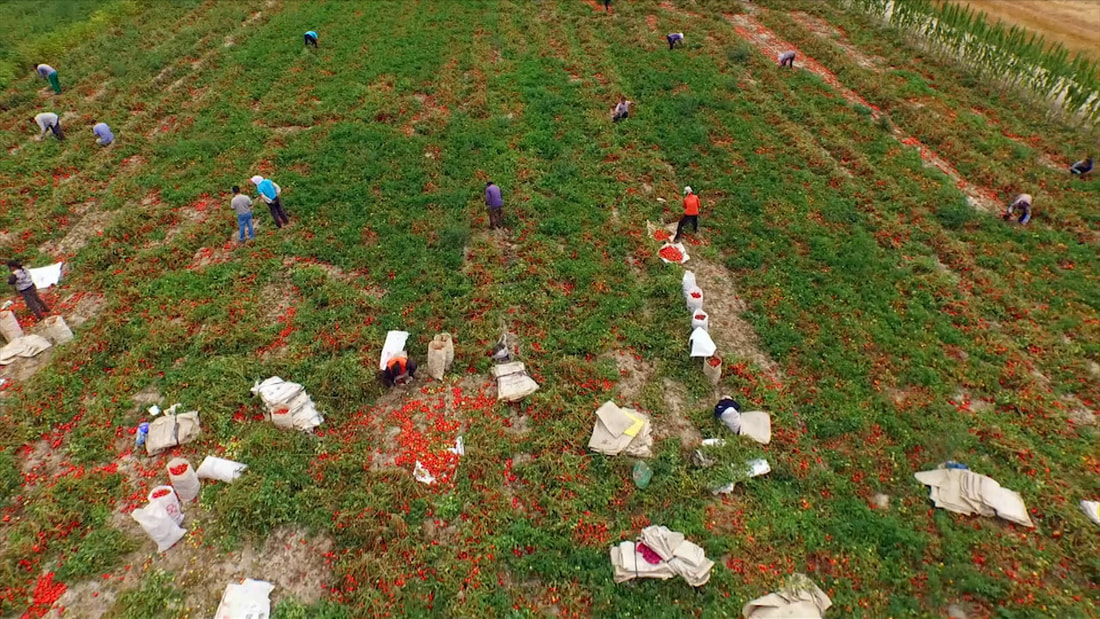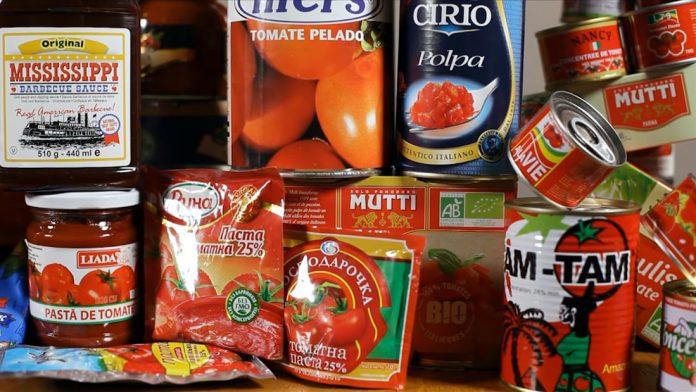(THIS ARTICLE IS MACHINE TRANSLATED by Google from Norwegian)
If there's one documentary you're going to see this year, make sure it does The Empire of Red Gold. The film is a startling account of how tomato puree is produced. The author Jean-Baptiste Malet – a digging journalist who has written for Le Monde Diplomatique and Charlie Hebdo, among others – has written a book on the same topic. Both the book and the film are based on studies Malet and his colleagues performed during the period 2014 to 2016 on the production, marketing and consumption of tomato concentrate – from France to China and from the USA to Italy.
Not just tomato concentrate. Today, tomato is the key ingredient in the vast majority of the world's cuisine. Africa, with its rapidly growing population, is the largest tomato concentrate market. Nigeria has close to 200 million inhabitants – the farmers who traditionally grow tomatoes, but the local producers of tomato puree are now concentrating on canning imported purée. Nigerian authorities conducted an analysis of several different brands sold on the market – some of which contained little or no tomato whatsoever.
Tomato puree placed China at the forefront of global capitalism.
One of the reasons for this is that most of the tomato puree produced comes from China, which interestingly does not use tomato in its own kitchen. China is nevertheless the leading producer of tomato concentrate in the world, and to such an extent that even when puree and puree-based products (such as ketchup or tomato juice) are sold in packages that state, for example, France as the country of origin, there is a great chance that The puree itself is made in China.
[ihc-hide-content ihc_mb_type = ”show” ihc_mb_who = ”1,2,4,7,9,10,11,12,13 ″ ihc_mb_template =” 1 ″]The changes China has introduced in the production and marketing of tomato puree, placed the country in the leading seat of global capitalism.
Grave journalism at its best. One of the most fascinating aspects of the documentary is that it is living proof that the media and journalists still constitute a fundamental democratic force. Malet performed a thorough study of how the global production of tomato puree actually takes place, and at the same time he has constructed a masterful presentation of the results of the study.
 In a media reality where the same content is simplified and recycled to satisfy recipients' needs to confirm what they already know, we meet here a journalist who has actually done their job, thus revealing matters that neither the public nor consumers were aware of.
In a media reality where the same content is simplified and recycled to satisfy recipients' needs to confirm what they already know, we meet here a journalist who has actually done their job, thus revealing matters that neither the public nor consumers were aware of.
As a grave journalism contribution shares The Empire of Red Gold several features we know from the news media, including the use of drawings and charts. But it also has a strong narrative structure, a quality we usually find within the fiction film genre that also includes a significant tension component – during the course of the film, the viewer gravely realizes that nothing is as it first impresses it to be.
Incredible revelations. We witness the participants in the production system themselves being taken to bed; producers of tomato puree that are losing market share because it has become too expensive, as well as consumers who do not know where the red puree on their plates comes from and what it contains. Often, fates take their unexpected turns. As Chinese producers of tomato puree won the African market, for example, African farmers stopped growing tomatoes because the imported puree was cheaper than their own fresh produce.
Nigerian authorities conducted an analysis of several different brands sold on the market – some of which contained little or no tomato whatsoever.
Today, many of them are among the migrants who, in their quest for a better future, risk their lives to cross the Sahel desert and the Mediterranean on their way to Europe. Finally, they find work on southern Italy's tomato fields.
Knowledge as power. In a sense demonstrates The Empire of Red Gold that knowledge is power. Perhaps tomato concentrate has been the central driving force of history – in that 20. century industrial and the 21. century global capitalism – simply because it constitutes a universal nutritional ingredient. And maybe it doesn't take much to avoid the devastating impact today's production of tomato puree has on farmers, producers and consumers now that we have gained insight into the costs.
Several things have changed since the movie came out. The Italian government has introduced a requirement that the country of origin of the tomatoes used to make puree and other products should be clearly marked on the label.
African farmers stopped growing tomatoes because the imported puree was cheaper than their own fresh produce.
Still, little has changed so far – probably because the stocks with the imported puree are still full.
However, there is reason for optimism. A step in the right direction for both consumers, farmers and food producers would be if the EU followed Italy's example. Thanks to The Empire of Red Gold nobody can say they didn't know about it.
You can rent the movie here
[/ ihc-hide-content]

